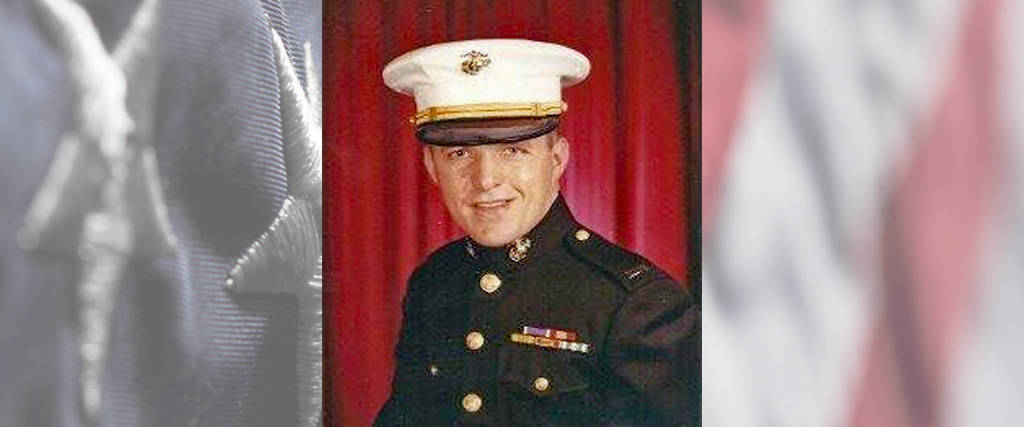U.S. Marine Corps Vietnam War Naperville, IL Flight date: October, 2019
By Mark Splitstone, Honor Flight Chicago Veteran Interviews Volunteer
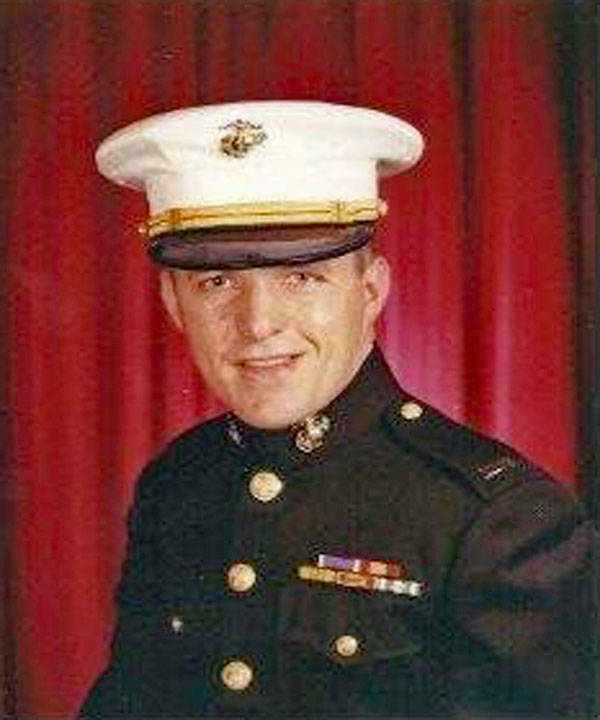
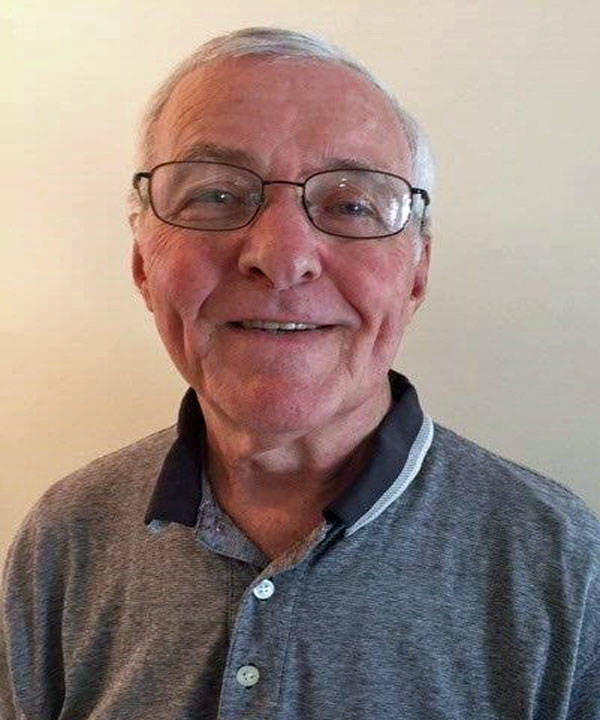
Dick Davis was born in 1946 and was raised in upstate New York in the town of Horseheads. His high school was very small, with only 25 people in his graduating class in 1964. When he was growing up, he recalls going on a field trip with the Boy Scouts to visit West Point. Even though his family did not have much of a military background, he remembers being fascinated by the school and being very interested in the military. This interest, specifically in aviation, led him to apply to a number of military colleges. He was accepted to his first choice, the Citadel.
The Citadel is located in Charleston, South Carolina, and at the time that Dick attended, it was all male. The Citadel had a very strong discipline system that was extremely tough on the freshmen, including daily inspections and reveille at 06:00 every morning. Students even had to ask permission to eat. He recalls that when his parents dropped him off, they asked if they could say goodbye, but were told that they could talk to him on parents’ weekend. Dick had visited for a weekend while he was still in high school and it was every bit as tough as he expected, and maybe a little more. Overall, though, he says that he enjoyed his time at the Citadel.
Upon graduating from college, Dick looked for a job. However, companies were reluctant to hire men with a draft classification of 1A, knowing that there was a good chance that they would be drafted shortly after they were hired. Dick had been a member of the Air Force ROTC while at the Citadel, but the Air Force was nearly full at the time that he graduated, so that option was closed to him as well. Several months after his graduation, he went to a Marine Corps recruiting station in Syracuse and decided to enlist. He qualified for the officer’s program which would allow him to join the Navy’s flight program that interested him. He signed up in December, 1968 and entered in January, 1969.
He was sent to Officer Candidate School in Quantico, Virginia, and after 10 weeks there he came out as an officer. At that point, he went to Pensacola, Florida, for naval flight training; it was a very tough, competitive program and unfortunately he didn’t make it. He went back to Quantico to The Basic School (TBS) for six months to become a basic officer. After graduation, he was assigned as a motor transport officer and was sent to Camp Lejeune in North Carolina for six weeks of motor transport school. Dick figured that Vietnam would be his next stop, but instead he was assigned to Camp Lejeune where he was a platoon leader for a month and a half.
Finally in May 1970, he was transferred to Vietnam and stationed at a base north of Da Nang. It was a strange time to be getting there because as he was arriving, other units were leaving as part of the overall reduction in American military presence during that period. In fact, one of his first assignments was to help prepare military vehicles to be transported back to the United States. He says that there were significant problems with morale and with drugs. Dick and his fellow officers received a lot of training about detecting drugs. He and his fellow officers tried their best to keep their men out of trouble, but they weren’t always successful.
The main role of his unit was to run resupply convoys to units that were out in the field. One day in early November, Dick volunteered to lead a convoy heading out. He remembers a lot of the specifics of that day, including testing all the weapons. He recalls his sergeant saying that he liked it when Dick was in charge of the convoy because he had the command truck be the third vehicle in the convoy rather than first, which is where some of the other commanders usually had it.
After about an hour, the convoy stopped because some mines had been detected in the road ahead of them. They waited while the mines were cleared and as the convoy started out again. Suddenly there was a massive explosion underneath Dick’s truck. He was thrown from the vehicle, and when he regained consciousness, he was lying on the road with his face full of blood. The truck that he had been riding in was destroyed and lying in a heap off to the side of the road. The driver had been blown through the cab but survived, although he did have to have his spleen removed. Fortunately for Dick, he had been riding on the bed of a newer truck that had armor plating on the bed. Previously, only sandbags had been laid on the bed for protection. Dick believes that the armor plating saved his life. When the Medevac helicopter came to get him, he recalls the pilot telling him to put something under his face because the pilot didn’t want blood to get all over his helicopter. Stories he heard later indicated that it was probably a command-detonated box mine that was triggered by a little old Vietnamese lady. Command vehicles were often targets, and while they tried to hide the antenna and other identifying items, it’s probable that their truck was the specific target, even though it wasn’t leading the convoy.
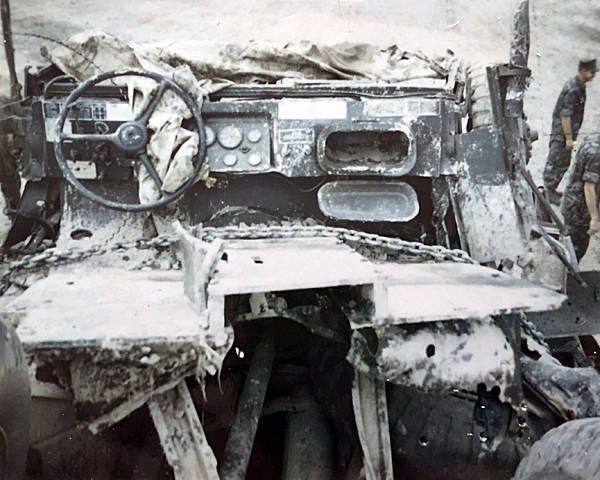
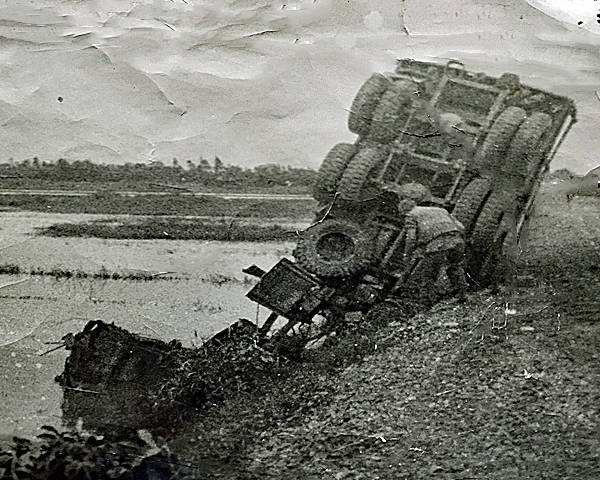
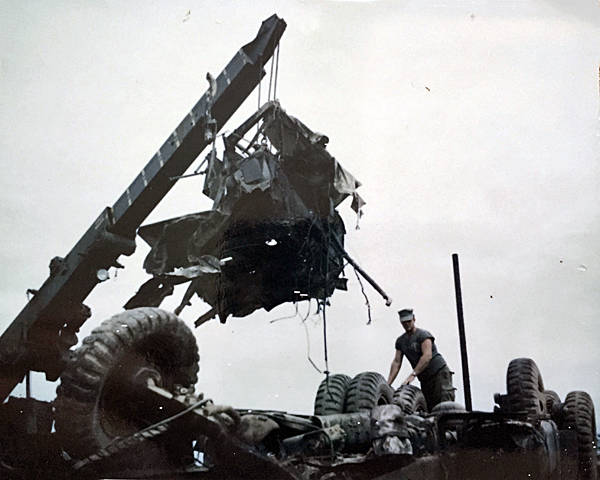
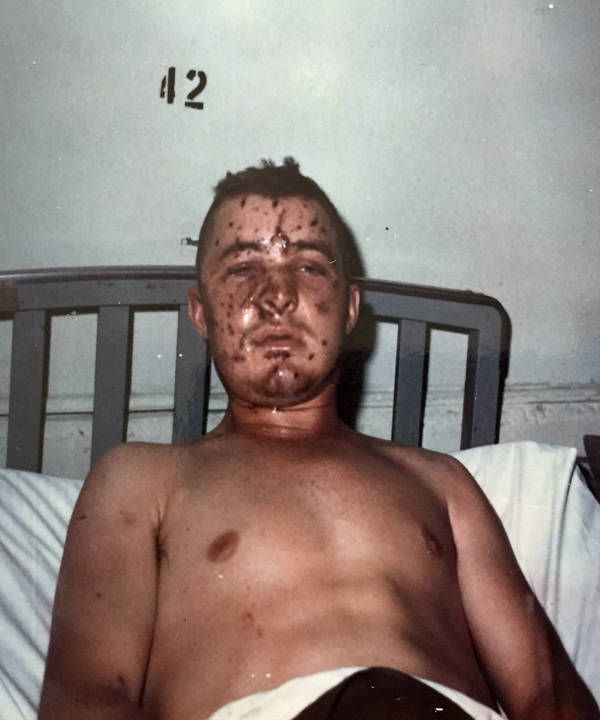
Dick was flown to a hospital in Da Nang and from there was transported to Japan, then Walter Reed Hospital near Washington D.C., and finally to St. Albans Hospital in Queens, New York. The first time he was able to take a shower and see his face in a mirror, the nurse warned him, “You’re not the best-looking kid on the block these days.” He had significant damage to his face from the shrapnel and from hitting the road when he landed. He had a punctured eardrum and damage to both eyes. His right eye was the most serious and they had to remove shrapnel from it. To this day there’s a hole in his eye which results in his having limited vision. Dick was hospitalized for nearly three months and upon his release in January, 1971 was transferred back to Quantico. He was assigned to be the treasurer of the officers’ club there. Because of his vision problems, he knew that his dreams of becoming a pilot were over. He stayed in the Marines until May, 1972, when he received a medical discharge as well as the Purple Heart and Navy Commendation Medal.
Dick had been a business administration major at the Citadel and upon leaving the Marines, he looked for a career in business. Mobil Oil liked to hire veterans and Dick got a job with them after leaving the service. He started his career in sales and marketing but eventually moved to production. Throughout his career, he lived in Detroit (several times), Florida, Virginia, and St. Louis before eventually moving to Chicago in 1995. This is where he was living when he took early retirement from Mobil in 2004. In the ensuing 12 years, he took on a number of temporary assignments and contract work at companies in the Chicago area before eventually retiring for good several years ago at age 70.
While Dick was stationed in Quantico, he met a young lady who was a school teacher at the base. The teachers at the school would often come to the events at the officers’ club and because of his job as club treasurer, Dick was usually there as well. That is where Dick met Linda and they continued to date after he was discharged. They eventually married in 1972, and now have three children and three grandchildren and still live in the house they moved into in 1995.
Dick recently attended his 50th reunion at the Citadel and was happy to see that of his graduating class of 343, there were 242 who were able to attend. Among those who weren’t there were five men from his class who died in Vietnam. He still sees and periodically communicates with men from his service days. He enjoys spending time attending a Bible study group at his church for veterans.



